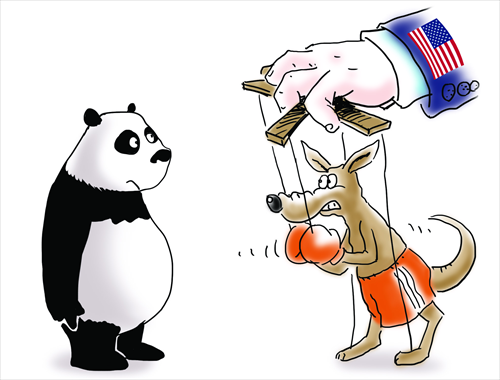Australia's China-threat wave indicates a nation eager to play US pawn role

Illustration: Liu Rui/GT
The Bolt Report on Sky News Australia on the night of September 10 was almost like "a bully's report," where ultra-conservative anchor Andrew Bolt intimidated and interrogated Gladys Liu, the first Chinese-born female Federal Liberal MP from Chisholm in Victoria, Southeastern Australia, on her social affiliation and connection with a few Australian-Chinese associations.
Bolt groundlessly insinuated Liu was a foreign agent and a member of Australia's so-called "Chinese Fifth Column." Other anti-China sharks, such as the self-proclaimed China expert Clive Hamilton, instantly smelled blood and closed in on the media unsavvy Victorian backbencher, alleging she was disloyal to Australia while serving another country's political agenda.
The target of this ferocious attack was not Gladys Liu herself, but China. By insinuating Liu was a Chinese agent who had infiltrated Australia's federal political arena, Cold War combatants have sounded the alarm once again on China as an evil menace to Australia's political sovereignty and national independence. The actions have provoked a new wave of paranoid hysteria among China-threat conspiracy theories.
This fear and smear campaign against China from Australian media outlets, specialists, and politicians has been underway since 2017, and to the disgust and impatience of fair-minded people in both Australia and China.
They ceaselessly split hairs in search of the slightest traces and nuances of the imaginary "Red Peril." Linkage with any organization or individual with Chinese connections is misinterpreted as a threat to Australia's interest and has created a Sinophobia among the public and inside political circles.
This 21st century witch-hunt has the unmistakable aftertaste of McCarthyism, the mythology of the Reds under the bed, which led to Liu's television lynching. It also terrorizes those who hold more independent and unbiased views on China-related issues. The most recent instance is the Sydney Morning Herald's attack on John Zhang, a staffer of New South Wales parliament's assistant president Shaoquett Moselmane, citing his and Moselmane's friendly relations to China as evidence of the alleged Chinese influence in Australia. Such doormat journalism is of little real value, but they vigorously contribute to the unrelenting crusade against Australia's comprehensive strategic partner, China.
Bloodthirsty anti-China hawks like Bolt, Hamilton and their ilk allegedly act as defenders of Australia's national interests, but they achieve precisely the opposite.
The demonization of China, Australia's largest economic partner, is irrational and irresponsible. Both countries have been economically, socially, and culturally linked with shared interests and benefits.
China is the biggest importer of Australia's high-quality, market-priced products and services, which means senseless attempts to decouple the two economies will only be detrimental to the interest and wellbeing of Australia and Australians.
The US has consistently instigated their allies to act as pawns by enlisting more support to gain leverage in its economic war against China. The US also aims to keep its political, technological, and military hegemony not only in the region but also in the world.
Will Canberra fall for the heinous trap and serve as Washington's legionnaire in the Asia-Pacific, while the Trump administration espouses its America First policy?
It was a decent gesture that Australian Prime Minister Scott Morrison condemned the defamation of Liu's political allegiance, calling such finger-pointing as "casting a smear on Chinese Australians."
Recognizably, Morrison's justification of Liu is not without partisan motive, but for the 1.2 million Chinese Australians who have been subject to unjust suspicion and bigotry, such remarks are significant. In contrast to his predecessor Malcolm Turnbull's reckless spoiling of the Australia-China relations, clear reason and judgment have prevailed for Morrison.
Morrison is paying a visit to the US from September 19 to 27, and US President Trump has promised to honor him with a state banquet. Arthur Culvahouse, the US Ambassador to Canberra recently demanded that Australia should "play a great power leadership role in the region."
Culvahouse likened Australia with himself 40 years ago as a timorous young man seeking opportunities with Goldman Sachs and said Australia needs to have more confidence and courage to combat China with the US. It is this condescending attitude and self-interest that has signified US foreign policy. Morrison would be better off if he kept Australia's national interests in mind while savoring foie gras at the White House.
The author is a professor and director of Australian Studies Center, East China Normal University. opinion@globaltimes.com.cn
